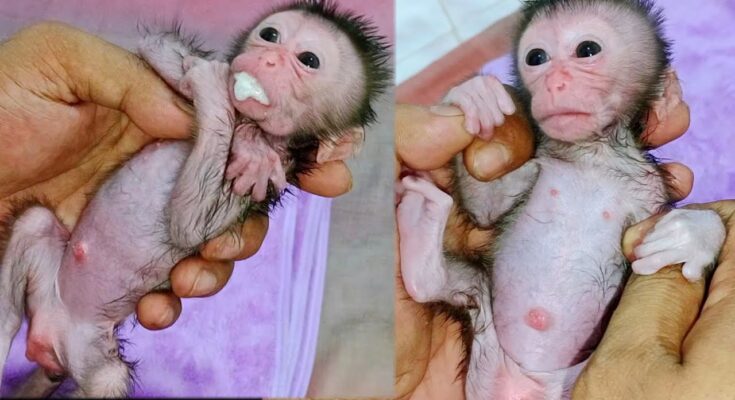Taking care of a baby monkey, especially one facing health issues like excessive milk intake and vomiting, requires patience, attention, and some basic veterinary knowledge. Here’s a comprehensive guide to help you address this problem effectively.
1. Understanding the Cause
First, it’s essential to understand why the baby monkey is consuming too much milk and vomiting. This behavior can be due to various reasons:
- Overfeeding: If the baby monkey is being bottle-fed, it might be consuming more milk than its stomach can handle.
- Improper Feeding Technique: Using the wrong type of bottle or nipple can cause the monkey to ingest air, leading to discomfort and vomiting.
- Health Issues: Gastrointestinal problems, infections, or intolerances to certain milk formulas could also be the root cause.
2. Adjusting Feeding Practices
To prevent overfeeding and vomiting, consider the following adjustments:
- Smaller, Frequent Feedings: Instead of giving large amounts of milk at once, feed the baby monkey smaller quantities more frequently. This approach helps the monkey’s digestive system handle the intake better.
- Proper Bottle Feeding: Ensure that the bottle and nipple size are appropriate for the monkey’s size and age. The milk flow should be steady but not too fast, to avoid the baby monkey swallowing air.
- Monitoring Milk Temperature: The milk should be at body temperature. Too hot or too cold milk can cause digestive issues.
3. Choosing the Right Milk
Not all milk is suitable for baby monkeys. Consult a veterinarian to choose the best milk formula. Some important considerations include:
- Specialized Formulas: There are specific formulas designed for primates that provide the right balance of nutrients.
- Avoiding Cow’s Milk: Cow’s milk can be too harsh for a baby monkey’s stomach and may cause gastrointestinal issues.
4. Monitoring and Adjusting Diet
Keep a close eye on the baby monkey’s reaction to its diet:
- Watch for Signs of Intolerance: If the monkey shows signs of discomfort, diarrhea, or continued vomiting, it may be intolerant to the current milk formula.
- Gradual Introduction: When switching formulas, do it gradually to allow the baby monkey’s digestive system to adjust.
5. Hydration and Electrolytes
Vomiting can lead to dehydration. Ensure the baby monkey remains hydrated:
- Oral Rehydration Solutions: Use these solutions to replenish lost electrolytes and fluids.
- Clean Water Supply: Always have clean, fresh water available for the monkey.
6. Veterinary Care
Regular veterinary check-ups are crucial:
- Health Assessment: A vet can perform a thorough health check to rule out any underlying conditions causing the vomiting.
- Treatment Plans: If an infection or other health issue is identified, the vet can prescribe the appropriate treatment.
7. Comfort and Environment
A comfortable environment aids in the baby monkey’s recovery:
- Warmth and Safety: Ensure the baby monkey’s living area is warm and secure. Stress can exacerbate health issues.
- Sanitary Conditions: Keep the feeding equipment and living space clean to prevent infections.
8. Observation and Patience
Patience and continuous observation are key:
- Monitor Progress: Keep a diary of feeding times, quantities, and the monkey’s reaction to each feeding.
- Adjust as Needed: Be ready to make necessary adjustments based on the baby monkey’s response to its diet and environment.
Conclusion
Helping a baby monkey with excessive milk intake and vomiting requires a blend of careful feeding practices, the right diet, hydration, regular veterinary care, and a comfortable living environment. By understanding the cause and making thoughtful adjustments, you can ensure the baby monkey’s health and well-being improve. Patience and observation are crucial, as each baby monkey may respond differently to changes in its care routine.
